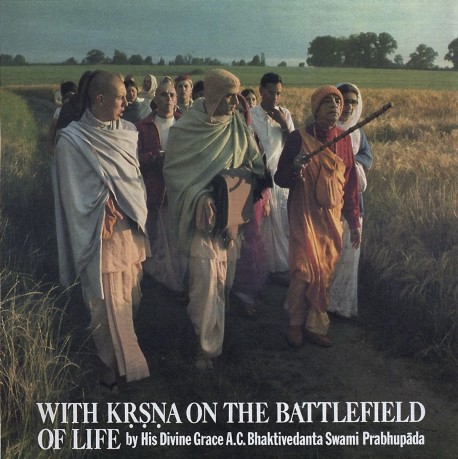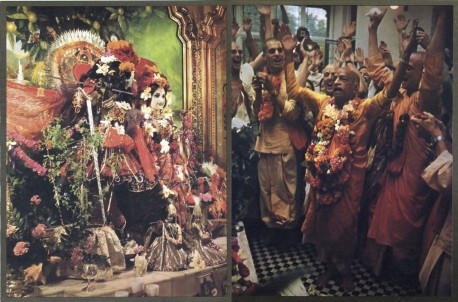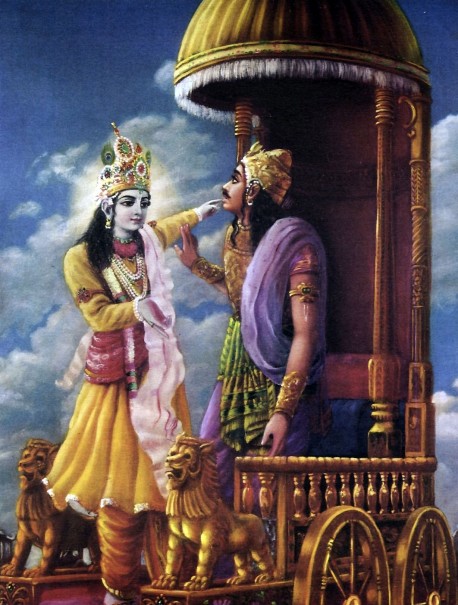 by His Divine Grace A.C. Bhaktivedanta Swami Prabhupada
by His Divine Grace A.C. Bhaktivedanta Swami Prabhupada
arjuna uvaca
senayor ubhayor madhye
ratham sthapaya me ‘cyuta
yavad etan nirikse ‘ham
yoddhu-kaman avasthitan
kair maya saha yoddhavyam
asmin rana-samudyame
“Arjuna said: O infallible one, please draw my chariot between the two armies so that I may see those present here, who is desirous of fighting, and with whom I must contend in this great battle attempt.” (Bg. 1.21-22)
tatrapasyat sthitan parthah
pitrn atha pitamahan
acaryan matulan bhratrn
putran pautran sakhims tatha
svasuran suhrdas caiva
senayor ubhayor api
“There Arjuna could see, within the midst of the armies of both parties, his fathers, grandfathers, teachers, maternal uncles, brothers, sons, grandsons, friends, and also his father-in-law and well-wishers-all present there.” (Bg. 1.26)
Now Arjuna is facing the problem. He is facing all his relatives—his grandfathers, his uncles, sons, friends, animals, etc. Yes, there were also animals—horses and elephants-present before Arjuna on the battlefield. According to the Vedic conception, animals are also members of the family. They are considered members because they render service. It is not that we are to give protection only to one section of our family. We should not take everything from an animal and give it no protection. This is not civilization. The family includes wife, sons, daughters, cows, dogs, etc. Speaking in terms of either family or state, we should not give protection just to some members of our family and cut the throats of others.
On the Battlefield of Kuruksetra all the members of Arjuna’s family were present before him, and the problem was that he had to kill them. Since the Battle of Kuruksetra was a family fight, some of the family members were on the other side as well as on Arjuna’s side, Arjuna was even faced with his superiors, his uncles and teachers (pitrn, acaryan), for there were those who were on the platform of father and grandfather-Bhismadeva and Somadatta. Even his great teacher Dronacarya was on the opposing side. Actually before fighting with Dronacarya, Arjuna cast an arrow at his lotus feet as a form of obeisance. Such was the etiquette. “My dear sir, you have taught me this fighting art. Now it is being used against you.” This is duty. As for Dronacarya, he shot an arrow that grazed Arjuna’s head, and he said, “My dear son, become blessed.” How blessed? “By killing me. I know you will kill me, so I give you my blessing.”
This material world is problematic, especially when we are involved in family, society, friendship and love. These are all entangling. In the Second Canto of Srimad-Bhagavatam it is stated: dehapatya-kalatradisv atma-sainyesv asatsv api. First of all the living entity has an attraction to his body, then to the offspring of the body. The individual is alone, he accepts a wife, and in this way, through the begetting of children, he expands himself. The woman is called stri because she helps the man expand. First the individual has affection for his own body, then the wife, then the children. In this way the individual expands his affection for the material world.
The material world means attachment; it is not required, but is a foreign thing. It is foreign because we are essentially spiritual—aham brahmasmi: “I am spirit.” But because we wish to lord it over material nature, Krsna has given us these bodies. He gives a body to the great god Brahma or to the ant—whatever one desires, if we want the body of a tiger, Krsna will give it; if we want the body of a hog, He will give that also. And if we want the body of a demigod, like Brahma, He will give it. If we want an American or Indian or English body, Krsna will give it. He is so kind. A son may be disobedient to his father because he wants to enjoy something, but the father says, “All right. Take the money—anything.” The father is so kind that even though he may not approve of what the son is doing, he says, “All right. You are free. Go ahead and take some money.”
This material life is a concession given to us by God in order that we may gratify our material senses. Actually Krsna does not want us to become entangled in this material world. Why does a man get married and beget children? When he is alone, he has no responsibility. Why take on the encumbrance of a wife, home, and children? Why make friends? Why go to such botheration? The answer is that we wish to enjoy. Krsna is also a person. Nityo nityanam cetanas cetananam. Krsna has produced so many children-all these living entities. Where does this idea come from that we will be happy with children, society, friendship, love, etc.? What is the origin of such an idea? It is there in Krsna. Krsna is the origin of love. He is loving Radharani, so the idea of love has come from Him. Whatever is within our experience is present in Krsna; therefore Krsna cannot be impersonal. He is a person exactly like ourselves, but the difference is that He is unlimitedly powerful.
Krsna also wants to live peacefully with His family. This Krsna consciousness movement is away of training ourselves so that we can again live within Krsna’s family. With these so-called families in the material world, we are suffering. The family idea is present in the material world, but it is only perfected in Krsna. The family idea cannot exist unless it is present in Krsna. Krsna is the origin of everything. Whatever we are seeing here in this material world has its origin in Krsna, but here it is perverted. When we see a tree, we see it standing erect, but when we see its reflection in a lake, it is upside down, topsy-turvy. Similarly, this material world is a perverted reflection of the spiritual world. It is false in the sense that it is a reflection. Those things which we see here exist in the spiritual world.
Because Arjuna was attached to society, friendship, family and love, when he was faced with his family on the battlefield, he began to shirk his duty. “Why do I have to kill my father and father-in-law?” he asked Krsna. “My friends, my sons and grandsons, my brothers. They are all present here.” It was natural that Arjuna became overwhelmed by compassion. “When the son of Kunti, Arjuna, saw all these different grades of friends and relatives, he became overwhelmed with compassion.” (Bg. 1.27) Why was Arjuna in such consciousness? The other side did not think in this way. Arjuna was thinking in this way because he was a devotee. A devotee does not like to kill anyone, not even an ant. So why should he be enticed to kill his friends? Arjuna’s compassion was the result of devotional life. All Arjuna’s belongings were taken away, his wife was insulted, and he was banished for thirteen years. Although he suffered so many atrocities, when the time came to kill, he was not very eager. He was ready to excuse even his greatest enemy, but Krsna did not want this. if a devotee is insulted, the devotee may excuse his enemy, but Krsna does not; therefore we should be careful not to insult a devotee. A devotee will excuse one, but Krsna will not excuse. Krsna is so strict that He cannot tolerate any insult against His devotee. Therefore the Battle of Kuruksetra was arranged. Arjuna was saying, “Oh, let them be excused. I will not fight.” But Krsna said, “No, you must fight. You must kill them.”
Arjuna, then, was in a dilemma. He did not wish to fight, but Krsna was insisting. Arjuna was thinking, “How shall 1 kill my kinsmen?” This was the real problem, if we want to please Krsna, we have to be prepared even to kill our so-called bodily relations. All Vedic civilization is arranged in such a way that we may become detached from so-called family attachment. First of all one must be a brahmacari; that is, he must live the life of austerity. A brahmacari is supposed to live in the home of the spiritual master and serve him. He may be a king’s son or a very great brahmana’s son, but he must work as a menial servant for the spiritual master. As soon as the brahmacari agrees to live with the spiritual master, he must live like a menial servant. Whatever the spiritual master orders, he must do. This is the meaning of brahmacarya.

Generally the brahmacaris are eager to do what the spiritual master asks because they are children and begin their life of brahmacarya from the age of five. A child will do anything when asked. If he is asked to go from door to door and beg alms for the spiritual master, he will do so. And when a child begs food or money, one will readily give it. In this way the brahmacari brings things to the spiritual master, and these things become the spiritual master’s property. It is not that because the brahmacari has begged, what he receives is his property. It is given to the spiritual master. After the food or whatever is prepared, the spiritual master tells the brahmacari, “My son, come on. Take prasada.” If the spiritual master forgets to call a brahmacari, the brahmacari will not eat. Although the brahmacari begs for the food and takes it to the spiritual master, if the spiritual master does not ask him to eat, he will not eat. He will starve. This is brahmacari life.
Thus one is first trained to become austere and tolerant. He is also trained up to consider all women as his mother. Indeed, he calls all women except his sister “mother.” Canakya Pandita has given the following definition of a learned man:
matrvat para-daresu
para-dravyesu lostavat
atmavat sarva-bhutesu
yah pasyati sah panditah
“He is learned who sees every woman but his wife as his mother.” This is the perfection of education. One must see all women except his wife as his mother. Furthermore: “The learned man sees all others’ property as no more than garbage in the street. And the learned man also thinks of other living entities as he does his own self.” We can experience pleasure and pain, and by this we know that when our head is cut we are in pain. Knowing this, how can we cut off the head of an animal? This, then, is the threefold test of education. The pandita, or learned man, sees all women as his mother and all property as no more than garbage in the street, and he considers all living entities as he would consider himself. Unfortunately today there are no learned men.
Vedic civilization is therefore meant to enable us to cut the knot of material attachment. If we at all want to go back to Godhead, our attachment for this material world-for so-called society, friendship and love-must be severed. As long as we have a pinch of attachment for this material world, there is no possibility of going to the spiritual world. Thus by training and education we must become detached. We have to understand the falsity of this so-called society, friendship and love. As Bhaktivinoda Thakura says, “We are being carried away by the waves of maya.” Mayara vase, yaccha bhese’, khaccha habudubu, bhai. Just as during the rainy season we see so many trees, vegetables and other debris floating down the river, we are also floating on the waves of maya. Sometimes we are drowning, sometimes we are on the surface, sometimes we are on this shore or that, but as long as we are in this material world, we are being tossed by so many currents. At one moment we may be master of some kingdom, and at the other moment we may be a dog. This is our position. Sometimes we are together, and the next moment the waves tear us asunder.
Thus we are all assembled here, tossed together by the waves of maya. We are thinking, “This is my father, this is my mother, this is my brother, etc.” But in actuality these are simply illusory combinations. No one is our father, no one is our mother, no one is our brother. These are all illusory and temporary combinations, but we are so much attached to such combinations that we refuse to go back home, back to Godhead. Therefore we must develop detachment from all such illusions. If we are thinking that in this material world we will be saved through the assistance of family, society, friendship, country, politics, sociology, science, etc., we are mistaken. It is not possible to be saved in this way. Each individual has to take care of himself. Our society, friendship and country will never be able to save us. We are under the clutches of maya. We have no independence, nor does anyone have the independence to save us. We may learn how to drive an airplane and go high in the sky, but if we are in danger, no other airplane can save us. Therefore we must be very careful pilots.
Thus in this material world everyone individually has to take care of himself. Everyone must see to it that he is saved from the clutches of maya. The acarya, or teacher, may give one hints as to how he can be saved, but the execution is in the hands of the living entity. If we perform our spiritual duty rightly, we are saved, if the acarya gives us instructions and we do not follow them, how can he save us? He can save us by his instructions and by his mercy as far as possible, but we have to take the matter in our own hands and take it seriously.
dehapatya-kalatradisv
atma-sainyesv asatsv api
tesam pramatto nidhanam
pasyann api na pasyati
(Bhag. 2.1.4)
We are, of course, thinking that we will be protected by our family, by our sons, our fathers, our grandfathers, etc. Everyone is thinking that his nation, community, philosophy, politics, or whatever, will save him, but all these things are temporary. They come and go. One who is too much attached to society, friendship and love is actually mad. He does not see that the father who gave him protection when he was a small child is no longer giving him protection. Now one may be thinking that his sons or wife are giving him protection, but how long will this last? Actually it is only Krsna who can give us protection, and He can give protection always. Society, friendship and love will be finished. Just as our grandfathers and fathers may be finished, so in the future our sons and grandsons will be finished. So no one but Krsna can actually give us protection. Therefore we must surrender to Him.
sarva-dharman parityajya
mam ekam saranam vraja
aham tvam sarva-papebhyo
moksayisyami ma sucah
“Abandon all varieties of religion and just surrender unto Me. I shall deliver you from all sinful reaction. Do not fear.” (Bg. 18.66)
Again, Krsna tells Arjuna, kaunteya pratijanihi na me bhaktah pranasyati: “O son of Kunti, declare it boldly that My devotee never perishes.” (Bg. 9.31) The best course, therefore, is to take to Krsna consciousness, fully surrender to Krsna, and in this way be protected. Otherwise, there is no protection; we will be carried away by the waves of maya.


Leave a Reply